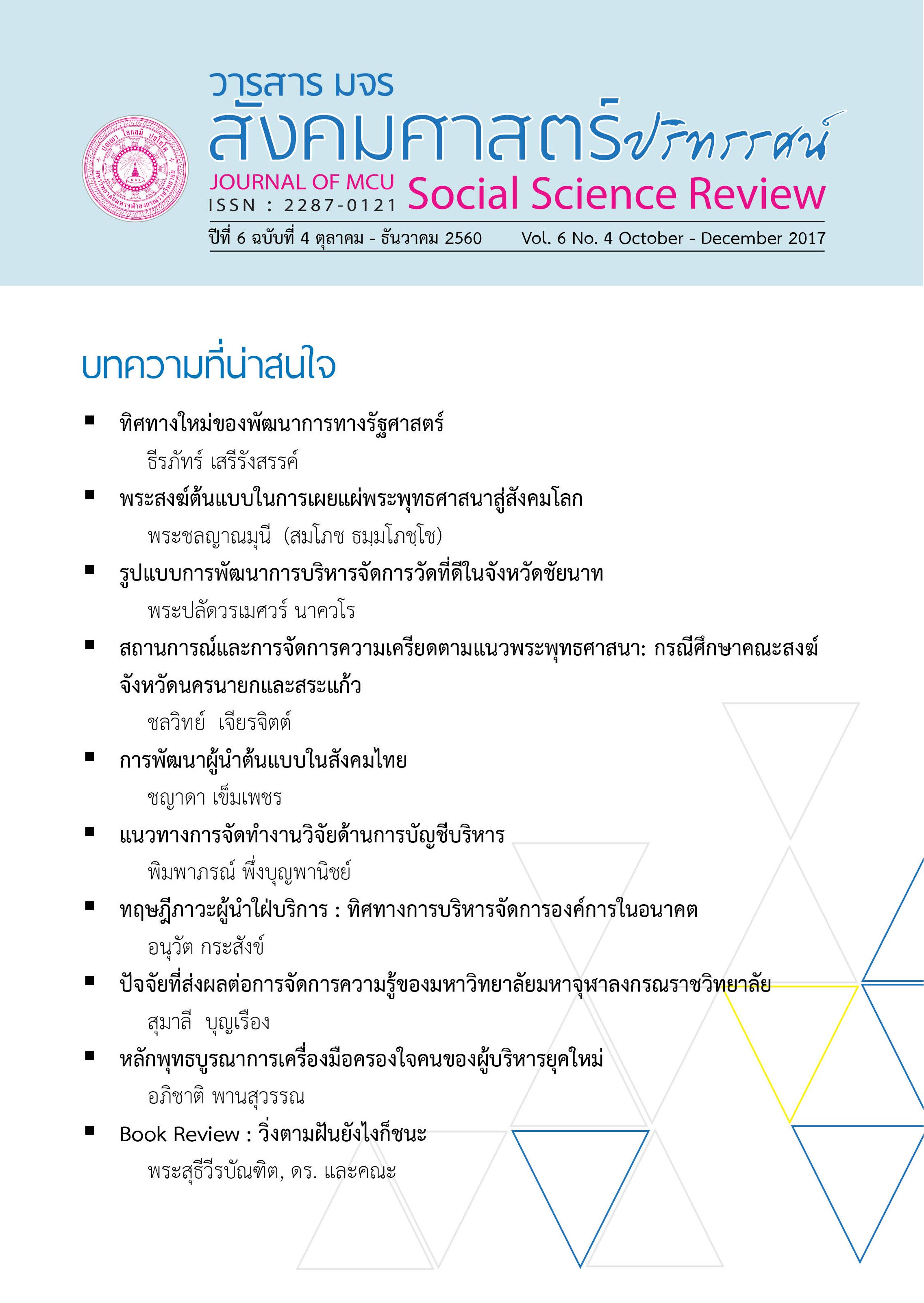การพัฒนาหลักสูตรฝึกอบรมแบบมีส่วนร่วมเพื่อเสริมสร้างสมรรถนะด้านการจัด การเรียนรู้ตามแนวคิดคอนสตรัคติวิสต์ สำหรับครูสังกัดสำนักงานเขตพื้นที่การศึกษาประถมศึกษานครพนม เขต 2
คำสำคัญ:
การพัฒนาหลักสูตรฝึกอบรม, สมรรถนะ, การมีส่วนร่วมบทคัดย่อ
การวิจัยครั้งนี้มีความมุ่งหมายเพื่อ 1) ศึกษาสมรรถนะด้านการจัดการเรียนรู้ตามแนวคิดคอนสตรัคติวิสต์ 2) ศึกษาความต้องการจำเป็นเกี่ยวกับสมรรถนะ 3) พัฒนาหลักสูตรฝึกอบรม และ 4) ศึกษาผลการทดลองใช้หลักสูตรฝึกอบรม กลุ่มตัวอย่างในการทดลองครั้งนี้ คือ ครูผู้สอนระดับชั้นประถมศึกษา สังกัดสำนักงานเขตพื้นที่การศึกษาประถมศึกษานครพนม เขต 2 ภาคเรียนที่ 2 ปีการศึกษา 2559 จำนวน 40 คน โดยเลือกแบบเจาะจง เครื่องมือที่ใช้ในการวิจัย ได้แก่ 1) แบบวัดสมรรถนะด้านความรู้ 2) แบบประเมินทักษะการปฏิบัติ 3) แบบวัดเจตคติ และ 4) แบบประเมินความพึงพอใจ ดำเนินการทดลองแบบกลุ่มเดียวทดสอบก่อนและหลังการทดลอง สถิติที่ใช้ในการวิเคราะห์ข้อมูล ได้แก่ ค่าเฉลี่ย ค่าเบี่ยงเบนมาตรฐาน ค่าทดสอบที และค่าความต้องการจำเป็น
ผลการวิจัยพบว่า 1) สมรรถนะที่พัฒนาขึ้น ด้านความรู้ จำนวน 5 สมรรถนะ 16 ตัวบ่งชี้ สมรรถนะด้านทักษะการปฏิบัติ จำนวน 4 สมรรถนะ 9 ตัวบ่งชี้ และสมรรถนะด้านเจตคติ จำนวน 1 สมรรถนะ 3 ตัวบ่งชี้ 2) ความต้องการจำเป็นเกี่ยวกับสมรรถนะอยู่ในระดับมากที่สุด
3) องค์ประกอบของหลักสูตรฝึกอบรมมี 9 ประการ คือ ความเป็นมาและความสำคัญ วิสัยทัศน์ หลักการ วัตถุประสงค์ สมรรถนะสำคัญ โครงสร้าง แนวทางการฝึกอบรม สื่อและอุปกรณ์ และการวัดและประเมินผล 4) ผลการทดลองใช้หลักสูตรฝึกอบรม พบว่าสมรรถนะด้านความรู้ของครูหลังการฝึกอบรมสูงกว่าก่อนอบรมอย่างมีนัยสำคัญทางสถิติที่ระดับ .05 และผ่านเกณฑ์ร้อยละ 80 สมรรถนะด้านทักษะการปฏิบัติของครูหลังการฝึกอบรมอยู่ในระดับดีมาก และสูงกว่าเกณฑ์ที่กำหนดไว้ที่ค่าเฉลี่ย 3.51 อย่างมีนัยสำคัญทางสถิติที่ระดับ .05 สมรรถนะด้านเจตคติของครูหลังการฝึกอบรมสูงกว่าก่อนการอบรมอย่างมีนัยสำคัญทางสถิติที่ระดับ .05 และความพึงพอใจของครูต่อการใช้หลักสูตรฝึกอบรมอยู่ในระดับมากที่สุด และสูงกว่าเกณฑ์ที่กำหนดไว้ที่ค่าเฉลี่ย 3.51 อย่างมีนัยสำคัญทางสถิติที่ระดับ .05
เอกสารอ้างอิง
Bureau of Policy. (2002). Plan and Standard of Educatio., Religion and Culture. National Education Plan No. 9 (BE 2545-2559). Bangkok: National Education Board.
Chanthima Saengloetuthai. (2007). The Development of Enrichment Curriculum To Enhance Information Communication Technology (Ict) Competency For Students of The Teaching Profession (Doctoral Dissertation). Graduate School: Srinakharinwirot University.
Goddard, Roger D. (2005).The Effects of Collective Teacher Efficacy on Student Achievement in Urban Public Elementary Schools. Dissertation Abstract International.
National Economic and Social Development Board.(2011). National Economic and Social Development Board No. 11. Bangkok: Office of the Prime Minister.
Patiphong Chongrutham.(2015). Development of a Training Curriculum for Encouraging the Instructional Management Competency of University Teaching Staff, Rajamangala University of Technology Isan (Doctoral Dissertation). Graduate School: Rajabhat University.
Powell, Anne E. (2009). Urban Elementary Teachers’ Perceptions of Teacher Workgroups: Exiling Professional Development Through a Sociocultural Lens. Dissertation Abstract International.
Secretariat of the Council of Education. (2010). National Education Improvement Plan (2009-2016). Bangkok: Chili Sweet Graphic Co., Ltd.
Somdet Sisaengchut. (2004). Manual of School Administration in Basic Education Schools Under the National Education Act. Chai Nat: The knowledge Development Club on Legal Regulations and Professional Standards Development. Office of the National Primary Education Commission.
Sumalee Chaiyacharoen. (2002).Theory of Designing Teaching in New Paradigms. Khon Kaen: Department of Technology Faculty of Education Khon Kaen University.
Surabaya Eamrong. (2005,February - April). Competency Management of Personnel: The Key to Thai Higher Education Development. Journal of Sakon Nakhon Rajabhat University,2(6), 50-60.
Suvimol Vongvanich. (2007).Research Needs Assessment. 2nd edition. Bangkok: Chulalongkorn University Press.
Suwadi Uppinchaichut. (2010). Developing Community Participatory Management Strategies for Basic Education Institutions in the Northern Highlands (Doctoral Dissertation). Graduate School: Chulalongkorn University.
Watcharapat Techajanasiri. (2010). The Development of Training Curriculum to Enhance Teacher Professional Competencies for Students Teaching and Practicing Teachers. Bachelor's Degree Programs (5 years) (Doctoral Dissertation).Graduate School: Burapha University.
ดาวน์โหลด
รูปแบบการอ้างอิง
ฉบับ
ประเภทบทความ
สัญญาอนุญาต
ลิขสิทธิ์ (c) 2017 วารสาร มจร สังคมศาสตร์ปริทรรศน์

อนุญาตภายใต้เงื่อนไข Creative Commons Attribution-NonCommercial-NoDerivatives 4.0 International License.
เพื่อให้เป็นไปตามกฎหมายลิขสิทธิ์ ผู้นิพนธ์ทุกท่านต้องลงลายมือชื่อในแบบฟอร์มใบมอบลิขสิทธิ์บทความให้แก่วารสารฯ พร้อมกับบทความต้นฉบับที่ได้แก้ไขครั้งสุดท้าย นอกจากนี้ ผู้นิพนธ์ทุกท่านต้องยืนยันว่าบทความต้นฉบับที่ส่งมาตีพิมพ์นั้น ได้ส่งมาตีพิมพ์เฉพาะในวารสาร มจร สังคมศาสตร์ปริทรรศน์ เพียงแห่งเดียวเท่านั้น หากมีการใช้ภาพหรือตารางหรือเนื้อหาอื่นๆ ของผู้นิพนธ์อื่นที่ปรากฏในสิ่งตีพิมพ์อื่นมาแล้ว ผู้นิพนธ์ต้องขออนุญาตเจ้าของลิขสิทธิ์ก่อน พร้อมทั้งแสดงหนังสือที่ได้รับการยินยอมต่อบรรณาธิการ ก่อนที่บทความจะได้รับการตีพิมพ์ หากไม่เป็นไปตามข้อกำหนดเบื้องต้น ทางวารสารจะถอดบทความของท่านออกโดยไม่มีข้อยกเว้นใดๆ ทั้งสิ้น





